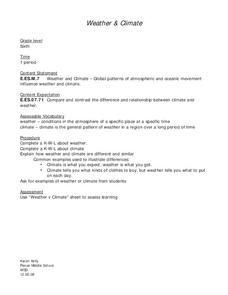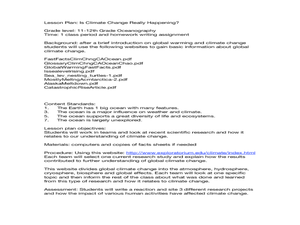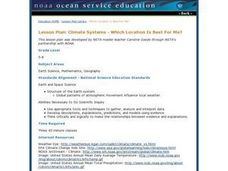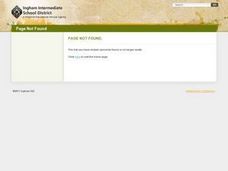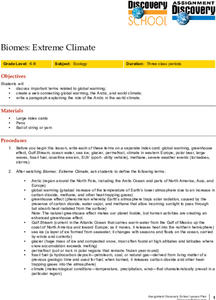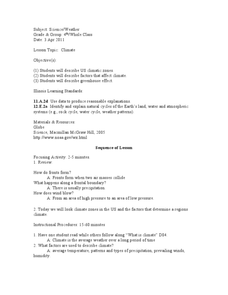Curated OER
Weather & Climate
Sixth graders differentiate weather and climate. In this earth science lesson, 6th graders complete a KWL chart about the two. They complete a worksheet by identifying whether a certain statement describes weather or climate.
Curated OER
Weather & Climate; Knowledge Quiz
In this weather and climate quiz worksheet, students complete a set of 10 multiple choice questions covering a variety of concepts related to climate and weather.
Curated OER
Weather v. Climate
Ninth graders discuss the differences between climate and weather as a class. Using data they collected, they create a graph of the data to share with the class over a specific time period. They compare and contrast this data with...
Curated OER
Climate Change
In these science worksheets, 5th graders explore aspects of weather and recycling. In the first worksheet, students are given five questions about weather which they match to the statement about weather that corresponds to it. In the...
Curated OER
Dangerous Atmosphere
Students discuss dangerous weather. In this science lesson, students decide on which state they want to research and check the Internet for the dangerous weather in that state. Students determine which weather hazard was the most...
Curated OER
Science Quizzes: Weather Quiz
In this weather science quiz worksheet, students respond to 20 short answer and true or false questions regarding weather and extreme weather.
Curated OER
Is Climate Change Really Happening?
Young scholars explore the impact of global warming. In this oceanography lesson, students investigate global climate change and write reaction papers about their research findings.
Curated OER
Weather, Climate and Atmospheric Process
Students explore Earth science by completing a could identification activity. In this weather lesson plan, students discuss the different forms of measurement for the weather of Earth. Students discuss global warming and examine a list...
Curated OER
Using Radiosonde Data From a Weather Balloon Launch
Student use radiosonde data from a weather balloon launch to distinguish the characteristics of the lower atmosphere. They learn the layers of the atmosphere. They graph real atmospheric data.
Maine Math & Science Alliance
Earth as a System
Ecosystem, human body system, weather system. We hear the word system a lot, but what does it really mean? In the activity, pairs or groups of learners discuss how a bicycle is a system and then analyze objects in their classroom and...
American Chemical Society
Climate Change and the Keeling Curve
Global warming has long been in the making. A thorough review of decades of research helps pupils discover the weather patterns of global warming. Learners then connect the weather changes to data in the Keeling Curve that reveals trends...
Curated OER
Climate Systems - Which Location Is Best For Me?
Students study the difference between weather and climate. In this climate systems lesson students search the Internet for the parts of the Earth's system, gather climate data and complete a challenge scenario.
Curated OER
Observing and Predicting Weather from a Weather Station
Fourth graders us a Weather Log data chart to record the date, time, day, and weather. They discuss different instruments and charts needed to record the information. Students turn in their weather logs at the end of two weeks and...
Curated OER
Using the Very, Very Simple Climate Model in the Classroom
Students study the relationship between the average global temperature and carbon dioxide emissions. In this weather lesson students develop a test scenario using a model then read and interpret graphs of data.
Curated OER
Biomes: Extreme Climate
Students create a web connecting global warming, the Arctic, and wold climate. They write a paragraph explaining the role of the Arctic in world climate.
Curated OER
Extreme Climate
Students discuss global warming, greenhouse effect, permafrost and other key words. In this climate lesson students create a web that connects global warming, the Arctic and world climate then write a paragraph explaining the role...
Curated OER
Our Eye in the Sky: The TIROS Weather Satellite
Young scholars investigate the political context of the creation of a weather satellite. In this technology and society instructional activity, students explore the historical, technological, and political context of the TIROS weather...
Curated OER
Ecosystems and Climate
Learners examine climatic effects on ecosystems. They plant tomatoes and observe the differences in plant growth with differences in light. They create picture collages of plants, animals, and insects found in each climate of the U.S.
Curated OER
Climate Change
Students define and associate words with the topic of climate change while completing associated worksheets. They read and discuss articles about climate change including the effects of global warming and the greenhouse effect.
Curated OER
Breaking it Down
High schoolers will identify the factors that contribute to erosion and weathering. They will start by differentiating between chemical and mechanical weathering. They then apply what they learned by playing the online jeopardy game. Key...
Curated OER
Does Global Warming Increase the Intensity of Atmospheric Natural Disasters?
Students study global warming by communicating the problem, process and solutions. In this global instructional activity students use graphs, research and write a critical stance on natural disasters.
Scholastic
Study Jams! Air Masses & Fronts
Four types of air masses interact in the atmosphere above the US. The collision of these air masses forms a front, which, in turn, creates our weather. Concepts are explained by Sam and RJ, thus preventing a snowball fight. Your class...
Curated OER
Biomes
Seventh graders research about the climate and weather in different biome types. In this biology lesson plan, 7th graders create a brochure of their chosen biome using Microsoft Publisher. They present their work in class.
Curated OER
Climate
Young scholars make and record observations about local weather. They write about their favorite kind of weather and what it would be like to live in a climate of their choice. They take a quiz on regional U.S. climates.


